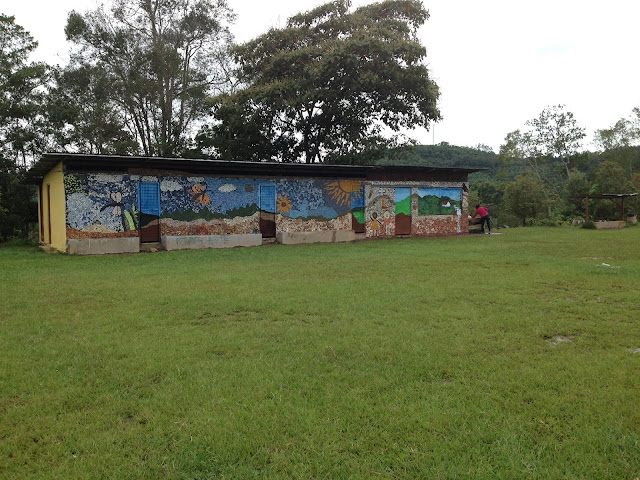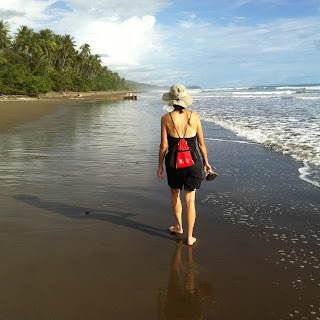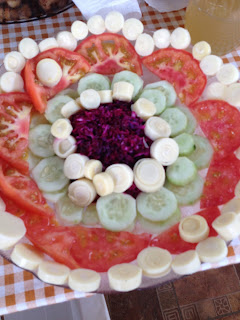I thought it would be fun to add up some numbers of things I kept track of while in Costa Rica.
To start with, I found out Francis and I each were one of 220,000 Peace Corps Volunteers to serve around the world since the inception of Peace Corps in 1961. We each were one of 120 volunteers currently serving in Costa Rica and one of 16 volunteers of Tico 28, the YD (Youth Development volunteers, who swore in on October 2, 2014). We were each one of 7 in the Los Santos region of Costa Rica and one of 4 who "gonged out" on September 14, 2016. (more about that later)
We rode the two and a half hour bus to and from San Jose 76 times for various Peace Corps office meetings, trainings and to meet friends to travel to other parts of the country.
We had 18 visitors from the United States, and hosted 22 boys from French Broad River Academy in Asheville, NC.
We hiked El Cero de la Cruz (the Cross on the Hill) 11 times.
and climbed La Colina de la casa de Gaebler (the 800 meter hill to our house from the center of town), 667x. (approximademente)
We identified 54 different varieties of birds with the help of many friends, both amateur and expert.
We visited 25 different beaches in Costa Rica, and my favorite was Playa Uvita, (Francis loved Playa Tortuga the best).
Pictures from our swearing in day October 2, 2014
 |
| Donny, Francis, Valeria, our Project Manager, Kirsten and me, on Gong Out Day, Sept. 14, 2016. |
We rode the two and a half hour bus to and from San Jose 76 times for various Peace Corps office meetings, trainings and to meet friends to travel to other parts of the country.
We had 18 visitors from the United States, and hosted 22 boys from French Broad River Academy in Asheville, NC.
We hiked El Cero de la Cruz (the Cross on the Hill) 11 times.
We identified 54 different varieties of birds with the help of many friends, both amateur and expert.
 |
| The Resplendent Quetzal |
We visited 25 different beaches in Costa Rica, and my favorite was Playa Uvita, (Francis loved Playa Tortuga the best).
I used the books 501 Spanish Verbs and the Spanish-English Dictionary at least 502 times. They became the most used and cherished books of all times for me.
We picked 27 kilos of coffee over 2 picking seasons.
...and drank 22 different brands of coffee, trying to find the just right flavor! In the end, one of my favorites and most available brands is called La Hermosa, grown in the Los Santos region of CR.
I wore out 2 pairs of shoes and wore a dress only 3x, during the 27 months.
We fed Yui (our friendly guard dog, pronounced "Jooey") 300+ apple cores and trained her to sit before she got fed.
 |
| Good dog! |
We judged 15 Spelling Bees at 10 different schools.
The school system in Costa Rica sponsors an English Festival every year from the institutional level all the way through to the National level. One of the competitions includes a 1 minute "Impromptu Speech" on a number of different topics from which the students can choose to talk about. One of the topics is called "Greetings and Leave-takings" used by native English speakers, which are the common ways to say "hello, how are you, good morning, good afternoon, nice to meet you, good bye, etc."
One class of 2nd graders that I taught mindfulness classes to, made me cards and lined up to give me a hug. They competed for giving me the longest hug!
The kids are showing their painted rocks which I gave them on our last day when we talked about "gratitude." The rock became our symbol of what we have to be grateful for.
 |
| We had a goodbye 'cafecito' with Ligia and Hijidio this day, a traditional afternoon coffee break with tortillas, crackers, sweet bread or sometimes a whole meal. |
The Counselors at the high school, who were our Project Partners (though we barely saw during our 2nd year, gave us choreadors(traditional CR coffee makers stands)and t-shirts for going away gifts. Next, we had cafecito in the dining hall at the school!
 |
| Alexjandra is making coffee using a choreador, pouring the hot water through a filter into a pot. |
We sadly said goodbye to our neighbors, the Zamora Obando Familia
 |
| Judith, Gabriel, Debora, Lorena, Nazareth and Emanuel. |
 |
| Esmeralda, Lorena and Javier |
And of course we said goodbye to Vilma and Monica. Vilma made our favorite CR dishes the last 2 nights we were there: for Francis it was black bean soup with hardboiled eggs and for me it was ground beef stuffed green peppers, both por supuesto (of course) served with rice!
Many times we heard Vilma say: Que Dios los acompañe, los protéje y los bendiga. Los extraña mucho y los quieremos montones! That God accompanies you, protects you and blesses you. We miss you and love you very much.
Many times we heard Vilma say: Que Dios los acompañe, los protéje y los bendiga. Los extraña mucho y los quieremos montones! That God accompanies you, protects you and blesses you. We miss you and love you very much.
 |
| Monica and Vilma, our host family. |
 |
| The finished wall, Sept. 12, 2016. |
 |
| We worked on the mosaic and celebrated our time in San Marcos with the friends we made during our service. |
 |
| The Scout leader presented us with a troop bandana and knot and made us honorary members of the Guias y Scouts! |
By the way, El Equipo Amigos won the game, 6-1!
I set out on The Peace Corps Adventure, with 3 goals in mind: to have an adventure, to do volunteer service and to improve my Spanish. Thank you, Peace Corps for this opportunity to meet my goals and much much more. As I said at our Gong Out speech, on Sept. 14, 2016; it took me about 2 years to figure out that the mission of Peace Corps, is not to change the system (like the Ministry of Education, which I wanted to tackle), but to make friends, begin to understand the culture (I realized this takes much more than 2 years also) and do a little good along the way. We worked very hard at all of those goals and I leave satisfied and grateful, full of stories and hopes to return someday. For now, I am happy to turn my attention to being home and spending time with family and friends.
Your Peace Corps service ends in Costa Rica with the Ceremonial Gong Out. This includes saying a few words and then hitting the gong, with the PC staff looking on.
And so, I end this blog as we end this adventure, with the country slogan. Until we meet
again Costa Rica:
Pura Vida: Bueno, con gusto// con salud//bien or muybien//De acuerdo, conforme, satisfecho//Expresión, usada como saludo y despedida (¿Todo bien?, Si!, pura vida!/ Hasta luego, pura vida!)
Literally, pure life, fine, cool, very well or everything is OK. It is used as a greeting, farewell, to express satisfaction or wellness. (Is everything OK? Yes, Pura Vida!/ Goodbye, Pura Vida!)
Literally, pure life, fine, cool, very well or everything is OK. It is used as a greeting, farewell, to express satisfaction or wellness. (Is everything OK? Yes, Pura Vida!/ Goodbye, Pura Vida!)

















































